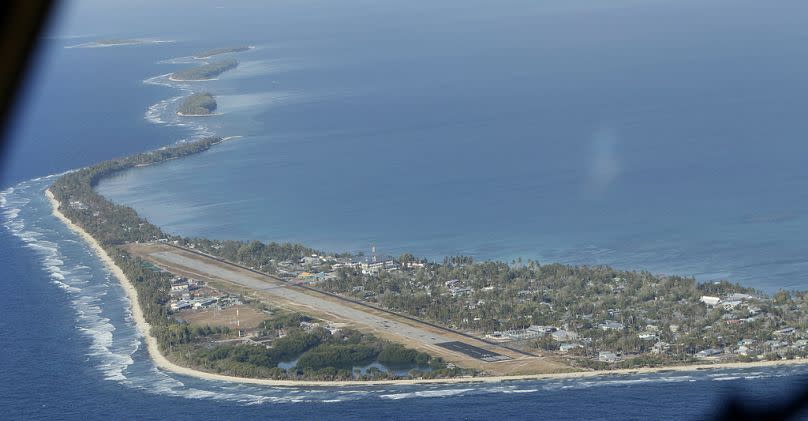International ocean tribunal delivers ‘historic legal victory’ for small island nations

- Oops!Something went wrong.Please try again later.
An international ocean court has just delivered a “historic” legal opinion outlining countries’ obligations in the face of climate change.
The International Tribunal for the Law of the Sea (ITLOS) - a UN court on maritime law - found that anthropogenic greenhouse gas emissions can be considered a marine pollutant. It said countries have a legal obligation to implement measures mitigating their effect on oceans.
ITLOS’s expert opinion was requested last September by a group of nine small island states in the Pacific and Caribbean threatened by rising sea levels: the Commission of Small Island States on Climate Change and International Law (COSIS).
The group’s legal counsel said that today’s outcome was a “historic legal victory for small island nations”.
“As the legal guardian of the Ocean Treaty, ITLOS has taken a critical first step in recognising that what small island nations have been fighting for at the COP negotiations for decades is already a part of international law,” said Professor Payam Akhavan, legal representative of COSIS.
“The major polluters must prevent catastrophic harm to small island nations, and if they fail to do so, they must compensate for loss and damage.”
What are the key takeaways from the first-ever climate advisory opinion?
ITLOS is a court established under the UN Convention on the Law of the Sea - an international agreement that establishes a legal framework for all marine and maritime activities.
It gave what is known as an advisory opinion on states’ obligations to protect the marine environment in accordance with this global treaty.
The Tribunal’s opinion spells out what international maritime law requires countries to do about climate change through their national and regional courts, national climate plans and international commitments such as those made at talks like COP29.
It was asked to consider three questions: do greenhouse gas emissions qualify as marine pollution, what are a State’s obligations to prevent and reduce that pollution and what are their obligations to protect and preserve oceans from the impacts of climate change?
It concluded that anthropogenic greenhouse gas emissions do constitute a form of marine pollution. This means that the legal obligation for states to protect and preserve the marine environment under the UN’s Convention on the Law of the Sea (UNCLOS) also applies to the main drivers of the climate crisis.
“States also have the obligation to protect and preserve the marine environment from climate change impacts and ocean acidification,” Judge Albert Hoffman said as he delivered the Tribunal’s advisory opinion in Hamburg on Tuesday.
“Where the marine environment has been degraded, this obligation may call for measures to restore marine habitats and ecosystems.”
Measures to combat climate change need to be objectively determined based on the available science, the Tribunal noted, but also the precautionary principle included in international law means this should apply even in the face of scientific uncertainty.
It added that, even if a State meets its obligations under the Paris Agreement, this doesn’t mean it has satisfied its legal obligations under the UNCLOS. These are independent obligations related to climate change, ITLOS said.

The advisory opinion recognised the UNCLOS as a means of addressing an “inequitable situation” faced by developing and climate-vulnerable countries that have contributed the least but suffer the most from climate change.
Judge Hoffman said countries must take all necessary measures to ensure emissions under their jurisdiction or control don’t cause damage to other states and their environment.
It also added that states have a specific obligation to assist developing countries - particularly those vulnerable to the effects of climate change - in their efforts to address marine pollution from emissions.
The Tribunal noted that climate change represents an “existential threat” which raises human rights concerns. It is yet another significant acknowledgement of the link between human rights law and countries’ obligations to take climate action.
What does this mean for future climate cases?
This is the first of three advisory opinions international tribunals have been asked to provide to clarify what legal obligations states have to combat climate change.
Opinions are also expected from the Inter-American Court of Human Rights and the International Court of Justice.
Though this advisory opinion itself isn’t legally binding, experts believe the clarifications on how international law should be applied could have a significant impact on how courts rule on climate issues in the future. It is also likely to influence international negotiations at COP29 in Azerbaijan later this year.
Prime Minister of Antigua and Barbuda, Gaston Browne, said ITLOS’s opinion would inform future legal and diplomatic work in “putting an end to the inaction that has brought us to the brink of an irreversible disaster”.

